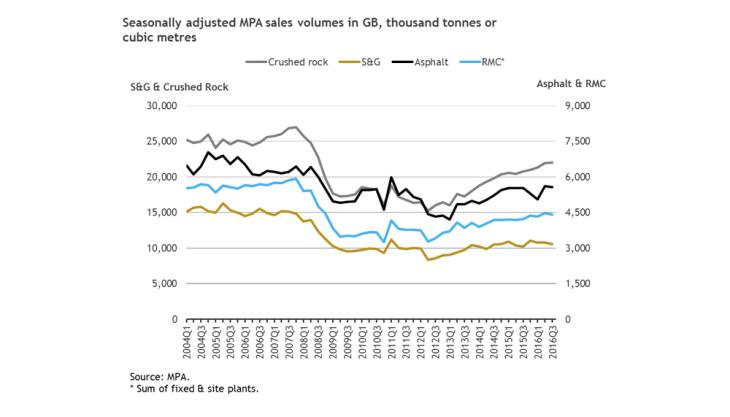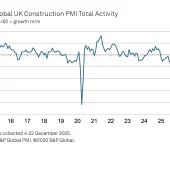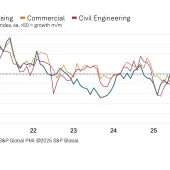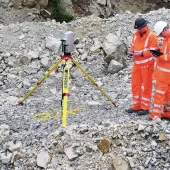MPA reports summer slowdown in construction activity

Mineral products sales lower in third quarter of 2016 but outlook for full-year remains positive
CONSTRUCTION market demand for mineral products was lower in the third quarter of 2016 compared with the previous quarter, providing some evidence of a slowdown in construction activity over the summer months, according to the latest quarterly figures from the Mineral Products Association (MPA).
Following strong market activity in the second quarter, MPA sales of ready-mixed concrete declined by 1.4% in the third quarter, while aggregates and asphalt fell more marginally by 0.5%. Mortar sales, however, grew by 1% over the quarter, after two quarters of relatively flat volumes.
Beyond the quarterly fluctuations, however, the longer-term trends remain positive and contrast with Office for National Statistics (ONS) outputs, which show more muted construction activity so far this year.
Sales volumes for all materials were higher in the third quarter this year than in the same quarter last year, and ready-mixed concrete and aggregates sales increased by 4.6% and 4.3%, respectively, in the year to September, compared with the previous year, whilst mortar sales stood 3.8% up.
With ready-mixed concrete and aggregates being used across all major construction sectors, particularly in the earlier stages of projects, they provide hard evidence of work happening on the ground.
Asphalt sales, however, have been volatile since mid-2015, raising industry concerns over the phasing and visibility of Highways England’s road programme. Despite 11% growth in sales volumes during the second quarter, asphalt sales were marginally down over the summer and stood 2.3% below their level in the year ended September 2016, compared with the 12 months to September 2015.
Looking forward, the weaker outlook for business investment and real wage growth as a result of the vote to leave the EU is expected to constrain construction activity through 2017/18, with infrastructure spending likely to be a more positive feature of construction from 2018.
Ready-mixed concrete and aggregates sales are now expected to grow by 3% over the period 2016–18, and 1% for mortar volumes. Asphalt sales, however, are expected to be 4% lower in 2018 compared with 2015, as local authority road budgets remain constrained and Highways England work is being delivered more slowly than previously expected.
Aurelie Delannoy, chief economist at the MPA, commented: ‘We don’t know if the slowdown in sales over the summer is due to the Brexit vote, but it is important to note the stronger than anticipated markets throughout 2016 so far. We anticipate the bigger Brexit-related impact for our materials to appear more clearly in 2017/18, in line with general construction activity.’
However, Ms Delannoy believes this outlook could improve notably if the political response to the referendum is to increase public investment and encourage private investment. ‘Decisions to accelerate the delivery of transport and energy projects, as well as general infrastructure and house building, would stimulate medium-term economic activity and boost productivity and long-term potential growth,’ she said. ‘Sluggish productivity growth is a longstanding problem for the UK economy; encouraging both public and private investment should help.’
According to the MPA, the need to stimulate regional growth is also particularly evident given the limited post-recession recovery in regions outside London.
‘The revival of interest in some form of Industrial Strategy linked to the regions could play an important part if it is action orientated, genuinely strategic and avoids trying to ‘pick winners’,’ said Ms Delannoy. ‘We hope that the forthcoming Autumn Statement will seize the opportunity to boost confidence to invest in both the public and the private sector in the UK.’









